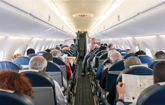Allergy & Asthma Network Urges Support for Airline Access to Emergency Epinephrine Act
VIENNA, Va., Nov. 16, 2015 /PRNewswire-USNewswire/ -- For families with food allergies, preparing to fly begins with a list of tasks:
- Alert the airline about the life-threatening allergy and request an accommodation;
- Carry epinephrine auto-injectors and store them where they can be easily accessed;
- Bring safe food; and
- Wipe down seats and tray tables.
Some airlines will support travelers by establishing allergen-free buffer zones or allowing passengers to preboard and clean seating areas.
"While these prevention strategies are appreciated," says Tonya Winders, President and CEO of Allergy & Asthma Network, "Congress is poised to do much more: Senate Bill 1972, the Airline Access to Emergency Epinephrine Act, will increase awareness and preparedness for responding to a life-threatening allergic reaction in a vulnerable place – 30,000 feet in the air."
This bipartisan legislation introduced by Senators Mark Kirk (R-IL) and Jeanne Shaheen (D-NH), would:
- Require airlines to carry epinephrine auto-injectors to be used in the event of an anaphylactic emergency;
- Require airlines to train crewmembers to recognize the symptoms of an acute allergic reaction and administer auto-injectable epinephrine;
- Direct the U.S. Government Accountability Office (GAO) to conduct and submit a report to Congress on air carrier policies relating to passengers with food allergies.
Current FAA regulations require epinephrine vials to be included in each flight's emergency medical kit; the new bill would replace these with easier-to-use epinephrine auto-injectors.
"Imagine trying to get the exact amount of epinephrine drawn from a vial into a syringe, all the while coping with turbulence and the stress of helping someone through a life-threatening emergency," says Marguerite Pennoyer, MD, board-certified allergist in Scarborough, Maine and Anaphylaxis Community Experts (ACE) volunteer. "Stocking undesignated epinephrine auto-injectors on airplanes will allow someone without formal medical training to administer the epinephrine and save lives."
Allergy & Asthma Network is joining with patient advocacy groups across the country to enlist support for the legislation and request the House of Representatives to pass a companion bill.
To find out more about the bill and how to contact your Members of Congress, visit: http://www.allergyasthmanetwork.org/advocacy/current-issues/airline-access-emergency-epinephrine/
About Allergy & Asthma Network
Allergy & Asthma Network is the leading national nonprofit organization dedicated to ending needless death and suffering due to asthma, allergies and related conditions. Allergy & Asthma Network specializes in sharing family-friendly, medically accurate information through its award-winning Allergy & Asthma Today magazine, E-newsletter, website at www.AllergyAsthmaNetwork.org and numerous community outreach programs. Follow Allergy & Asthma Network on Facebook and Twitter at AllergyAsthmaHQ. Join Allergy & Asthma Network at www.AllergyAsthmaNetwork.org/join.
About ACE
The Anaphylaxis Community Experts (ACE) program is developed by Allergy & Asthma Network in partnership with the American College of Allergy, Asthma & Immunology (ACAAI), National Association of School Nurses and American School Health Association and sponsored by Mylan Specialty L.P. The program goal is to save lives through showing parents, school staff, emergency responders, and others how to recognize and respond immediately to anaphylaxis symptoms.
To learn more about the ACE program or request an ACE team presentation, email Brenda Silvia-Torma, ACE Program Manager, at [email protected].
Contact: Gary Fitzgerald
Allergy & Asthma Network
703-641-9595
[email protected]
SOURCE Allergy & Asthma Network
Related Links
WANT YOUR COMPANY'S NEWS FEATURED ON PRNEWSWIRE.COM?
Newsrooms &
Influencers
Digital Media
Outlets
Journalists
Opted In




Share this article